There is no way to honestly and thoroughly study United States history without including black history, and I think most home educators would agree – at least the ones I spend time with.
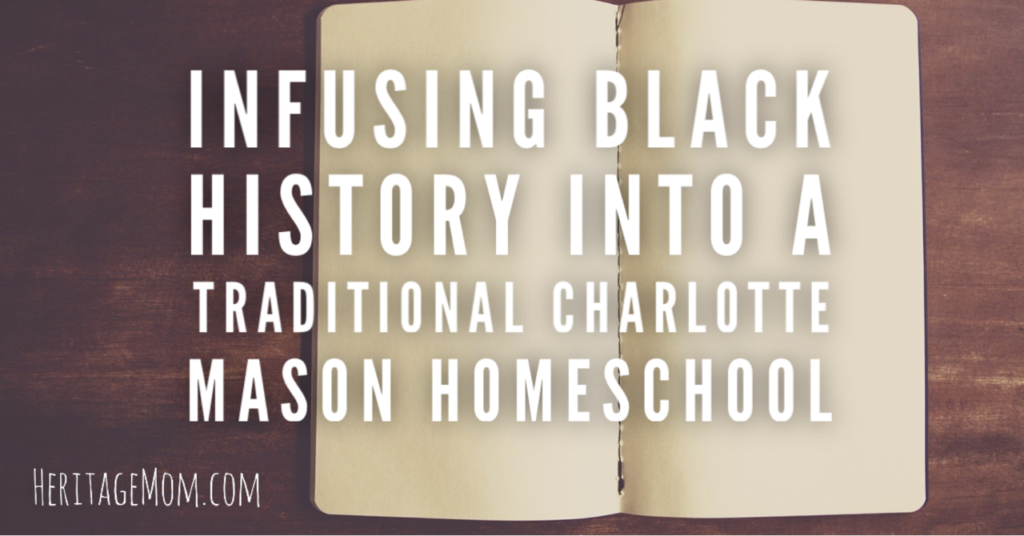
The question becomes, “How much black history is enough?” and each parent will have to answer that question for themselves. For me, it’s a bizarre query that leads me to wonder,
“How much white history is enough?”
I think black history is American history, white history is American history, and the history of America’s indigenous peoples is most certainly American history. The list goes on, and there is no quota on any of it because I want my children to have as complete a picture of American history as reasonably possible. I feel that they’re inseperable, so while I’m using the term here, I never mention “black history” as a subject in our homeschool. It’s simply history.
Without having a numerical goal in mind, I work (and it is certainly labor) to ensure that a significant amount of our United States history studies include dedicated examination of the experiences and contributions of black people in this country. Here is my approach to U.S. history:
- A general American history book. Most focus on white people and their experiences but are sprinkled with tales of black people and other people of color. The stories included are worthy tales of people and the decisions they made that explain so much about our country and how it came to be.
- General Black American history books. These books focus on what black people were doing and experiencing during the time period being studied. I have yet to find a single tome that encompasses all, or even most, of what I want to share with my kids, so I typically use several books to carry us through the year.
- Historical fiction. I schedule books with protagonists of various backgrounds, but we always have at least one book with predominantly black characters or significant black experiences going along with the others.
- Biographies. As with historical fiction, I schedule biographies on a wide range of people from the time period we’re studying, but at least every other biography the children read is about a person of color – usually black but not always.
- Picture study, composer study, poetry, hymns, folk songs. I mix in black artists, poetry, and music along with the (mostly white) recommendations generally provided by Charlotte Mason curriculum providers, experts, and other moms.
- Field trips. I don’t see robust discussions regarding field trips in many Charlotte Mason circles, but they have always been an integral part of our homeschool. Nothing makes my heart sing like a top-notch historical field trip that brings to life what we’ve been reading.
This school year my family is studying modern history (1900 – present), but we started with parts of the late 1800s that we didn’t quite finish up last year. Visit my Book Recommendations page for Black history posts for the other historical time periods. Here is an overview of my specific program (*Follow asterisk links for lesson details):
Disclosure: As an Amazon Associate, I may earn commissions from qualifying purchases using these links, at no additional cost to you.
General American history book: Stories of America, Volume 2. I wasn’t originally sold on this book. Honestly, I ended up with it because I ran out of time and couldn’t find anything better, but I have been really pleased. The chapters are the perfect length, and the stories are always engaging and memorable. It doesn’t sling around a bunch of random dates or try to fit in every detail of each scenario. It’s never boring, and even I always learn something (usually many things) new each time we read it. I’ve been happy with everything I’ve ever gotten from Simply Charlotte Mason, and I’m glad I got “stuck” with it because it’s been a great fit.
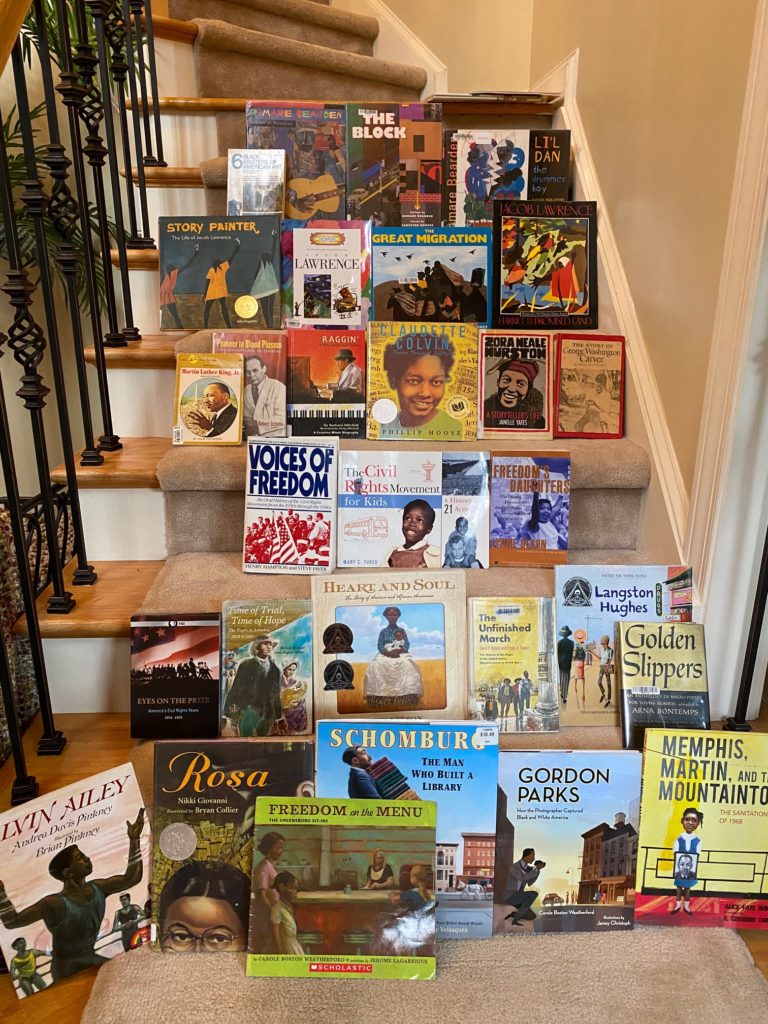
General Black American history books:
- Heart and Soul: The Story of America and African Americans. We picked up with Chapters 7-12 as we covered the first half of the book last school year. Topics covered include The Great Migration, Harlem Renaissance, Women’s Rights, Great Depression, World War II, Black inventors, Jim Crow, and the Civil Rights Movement. This book provides a high-level overview – not a detailed account – so it’s a great way to introduce a deeper study. The illustrations are phenomenal and infused with much emotion.
- The Unfinished March: The History of the Negro in the United States, Reconstruction to World War I. Published in 1967 by Zenith Books which set out to “present the history of minority groups in the United States and their participation in the growth and development of the country,” this book is a poignant and honest look at some very dark years for black people in America. It’s not a good choice for gently introducing black history; it’s better saved for when you’re ready to “get real,” and I was ready, so I loved it. It’s a more intriguing and less dense read than Time of Trial below, so it’s nice that it comes first chronologically if you choose to read both. Term 1 book.
- Time of Trial, Time of Hope: The Negro in America (1919 to 1941). The time period covered by this book partially overlaps with The Unfinished March above and they share a publisher, but the authors are different, so the perspectives and emphases are unique. It moves from the return of the black soldiers of the 369th Infantry from France in 1919 to Harlem, to the March on Washington in 1940 to demand the abolition of discrimination in all government departments, the army, navy, air corps and national defense jobs on the eve of World War II. It goes into the causes of the Great Migration and the Great Depression, describes the gains on artistic, political, labor fronts—the Harlem Renaissance, the New Deal “Black Cabinet,” and more (description edited from Kirkus). There are a few boring paragraphs in the book (lists of random names or too many acronyms). Term 2 book.
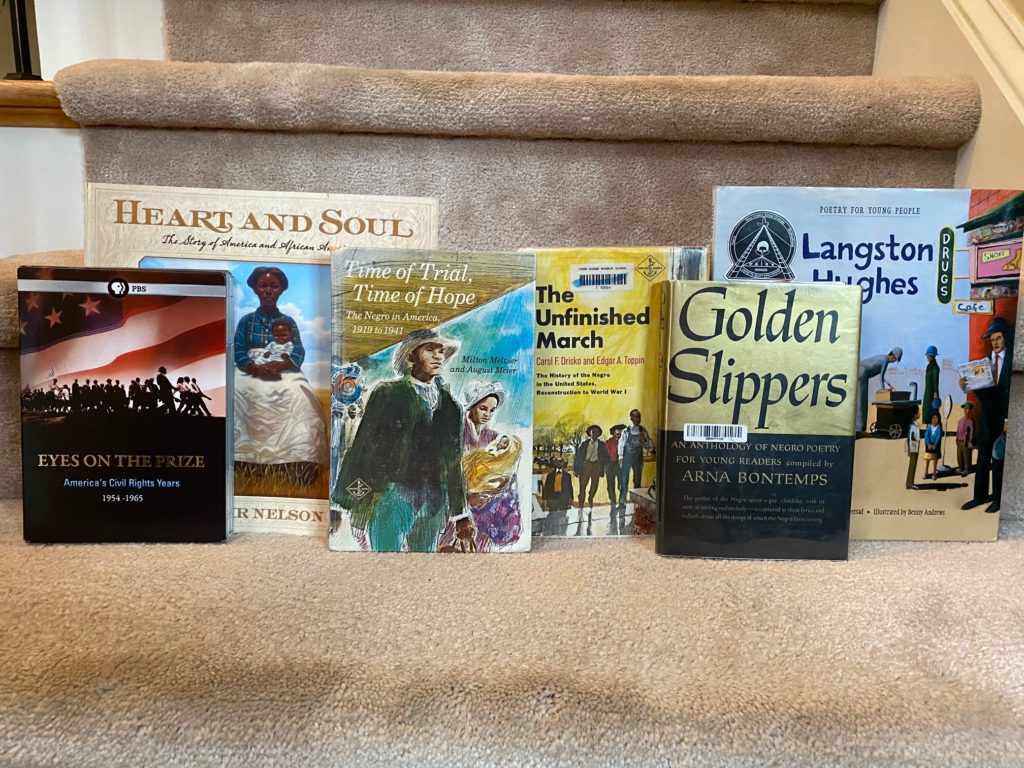
- The Civil Rights Movement for Kids. “…children will discover how students and religious leaders worked together to demand the protection of civil rights for black Americans. They will relive the fear and uncertainty of Freedom Summer and learn how northern white college students helped bring national attention to atrocities committed in the name of segregation, and they’ll be inspired by the speeches of Martin Luther King, Jr., Medgar Evers, and Malcolm X.” We’re just beginning Term 3, and we’ll be doing an in-depth study on the Civil Rights Movement for the entire term. I’ve done my best to review many options online, and I’m hopeful and excited about this one. The format is entirely different than our Term 1 & 2 narratives above, and though I’d hoped to find a similar book for this term, I truly was not able to find what I’d envisioned. It is unlikely that we’ll pursue many of the activities in the book, but we’ll see. I’ll update here with my opinion once we’ve read it. Term 3 book. [Warning: This book has strong cursing (repeating an evil thing that was said to someone) on page 128.]
- Freedom’s Daughters: The Unsung Heroines of the Civil Rights Movement from 1830 to 1970. “In this groundbreaking and absorbing book, credit finally goes where credit is due — to the bold women who were crucial to the success of the civil rights movement. From the Montgomery bus boycott to the lunch counter sit-ins to the Freedom Rides, Lynne Olson skillfully tells the long-overlooked story of the extraordinary women who were among the most fearless, resourceful, and tenacious leaders of the civil rights movement.” Term 3 mama book.
- Voices of Freedom: An Oral History of the Civil Rights Movement from the 1950s Through the 1980s. “In this monumental volume [the authors] draw upon nearly one thousand interviews with civil rights activists, politicians, reporters, Justice Department officials, and hundreds of ordinary people who took part in the struggle, weaving a fascinating narrative of the civil rights movement told by the people who lived it.” Term 3 mama book.
Freedom’s Daughters and Voices of Freedom are books that I purchased for myself. Honestly, I’m learning black history right alongside my children. They know more now than I knew when I graduated from college, and I’m committed to continuing my own education in order to help lead them well. Voices of Freedom is a companion book to the documentary Eyes on the Prize: America’s Civil Rights Years which I purchased for my family to watch throughout Term 3.
Note: Due to the length and depth of the civil rights books I bought for myself, I’m certain that I won’t even come close to completing them this term. I’ll select the chapters with info I’d like to share with my kids for this year, and I’ll continue to work through the books in future years. Eventually, I’ll turn them over to the children to read themselves when they’re older.
Historical fiction. This is, by far, my absolute favorite category, and I know my children would agree. They beg for our historical fiction read alouds at bedtime which I find hilarious (because I hated history growing up) as well as insanely gratifying. I’ve found incredible richness across nearly all the stories we’ve read this year! I have so much to say about this that it needed its own post, so you can read about some of my top picks for African American Historical Fiction here.
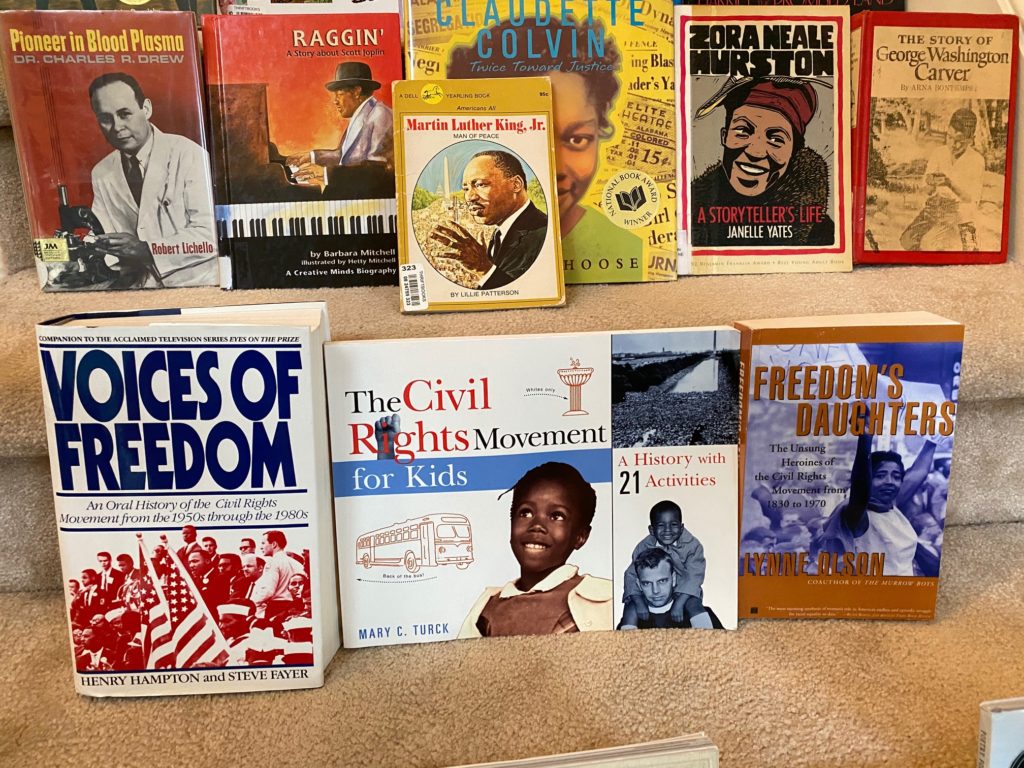
(Voices of Freedom and Freedom’s Daughters are my adult books)
Biographies. So many people, so little time. I choose the biographies for each term, my children read them silently or aloud, and they narrate. I’ve found that they can generally only read 1-2 per term, depending on the length and their interest. That gives us 3-6 biographies a year, per child.
I try to pick a variety of people – those who served the Lord faithfully, are likely to come up in common conversation, overcame great adversity, beautifully pursued a passion, or represent a broader group of people or significant time period.
My independent readers often read about the same people, but they read different books because of their disparate reading levels. This year, they have read or are reading about the following people along with FDR, Helen Keller, The Wright Brothers, and more:
- George Washington Carver
- MLK Jr. (preceded by Gandhi)
- Zora Neale Hurston
- Claudette Colvin
- Dr. Charles Drew
- Multiple people from Heroes in Black History: True Stories from the Lives of Christian Heroes – Contains short bios with a few stories of each hero. I didn’t assign this book, but one of my kids likes it and reads it on her own sometimes. I used this book for ideas of full biographies to purchase for our home library.
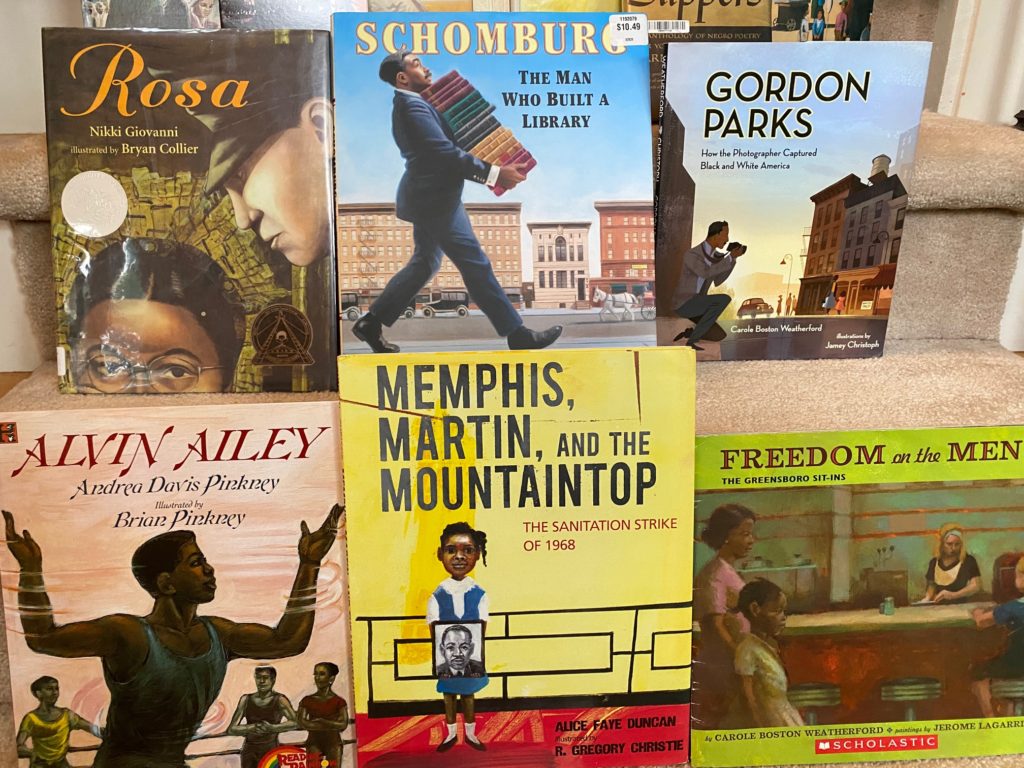
I often read picture books with my emerging reader (but my big kids always want to join in even though they’ve heard them before). Our latest reads are:
- Rosa
- Schomburg: The Man Who Built a Library
- Freedom on the Menu: The Greensboro Sit-ins
- Memphis, Martin, and the Mountaintop: The Sanitation Strike of 1968
- Gordon Parks: How the Photographer Captured Black and White America
- Alvin Ailey
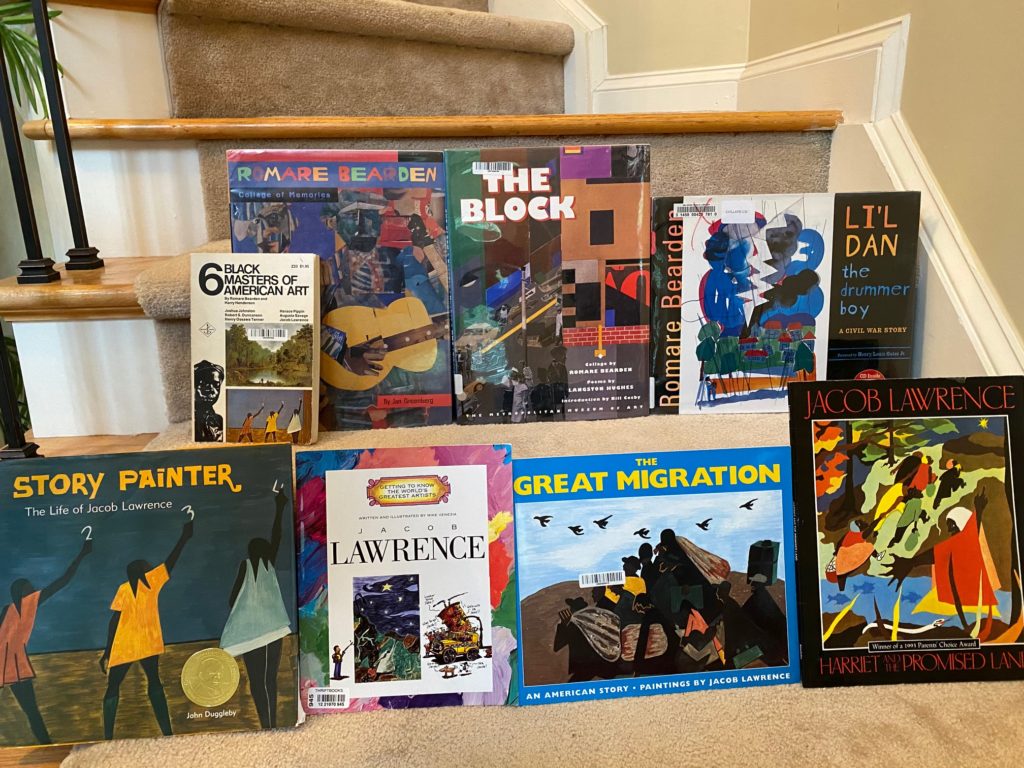
Picture study: Romare Bearden* (Term 1), Jacob Lawrence* (Term 2)
Composer study: We spent Term 2 studying Scott Joplin.*
Poetry: Along with regular readings from Favorite Poems Old and New, we read poems from Effie Lee Newsome* (Term 1) and Langston Hughes (Term 2). For Term 3, we’re reading from Golden Slippers, An Anthology of Negro Poetry for Young Readers. Families with older students may also enjoy The Poetry of Black America: Anthology of the 20th Century. We own this and will use it at some point, but I decided to hold off on it until my kids are older because so many of the poems have mature themes. I could go through it and hand pick good ones for this term, but it’s easier to just use Golden Slippers.
Folk songs: We’ve been singing a lot of Elizabeth Cotton* this year. We’ll sing one of her songs, move on to something else, and then jump back into another one of her songs. They’re simple to learn but fun to sing. I’ve even caught my preschooler humming her catchy tunes.
*Follow links for lesson details
Hymns: I hate to call certain hymns “black” and others “white” because in many cases, the lyrics are identical, but the musical treatment is different. Although, there are certain hymns that I hear when black folks are praising the Lord and certain ones I only hear when worshipping with white folks. We like them all, so we sing them all.
I basically just make sure my kids learn lots of hymns sung the “black” way (I’m cringing & giggling simultaneously because I’m sure there’s a better way to discuss all of this, but I’m just being honest).
Hymns are an important part of our shared Christian experience, but I grew up hearing the black versions sung at church and by my family members, and I want to pass them down to my children that way. My great aunts and uncles broke out into soulful song during our family reunion just last summer, and I loved watching my kids comfortably join in. There is nothing like worshipping Him as a family.
I’ve not heard anyone mention contemporary praise & worship music as part of school lessons, but I occasionally include it right along with the traditional hymns – especially those that sample from old hymns. Example: After learning It Is Well With My Soul, we learned It is Well by Kristene DiMarco. So basically, we mix it up – black, white, old, new – all of that.
Field trips. I could write a whole post about every field trip, but for the sake of time, I’ll just list a few of our best black history field trips so far this year:
- Fight for Your Rights: The History of African-American Progress (Atlanta History Center) – “Do you have what it takes to be a Freedom Fighter? Looking back on history, it’s easy for students to say they would have been a Civil Rights activist. But the decision gets harder when they are confronted with real-time decisions that require them to show courage, determination and the discipline to stick together in a non-violent struggle. By participating in historical simulations that employ museum theatre, students will unite together in a sit-in at Lester Maddox’s Pickrick Restaurant, travel courageously into the Deep South on a Freedom Ride, and register to vote after a rousing call to action by John Wesley Dobbs. This school tour is more than a mere explanation of a past movement for progress, this program empowers students with skills they can use to create the change they hope to see in today’s world.”
- Special exhibition featuring the art of famous African-American artist, Romare Bearden (The High Museum of Art) – “In 1978, Romare Bearden launched an autobiographical project organized by the decades of his life. The Profile series begins with Bearden’s earliest memories as a boy in North Carolina in the 1910s and concludes with his life as a young artist in Harlem in the early 1940s.“Something Over Something Else”: Romare Bearden’s Profile Series is the first reassembling of the Profile exhibitions. A majority of works in the series are brought together in their original order and exhibited with the text as Bearden first intended. Following the Bearden exhibit, we will continue with a “Celebrate Black History” tour highlighting work by other African-American artists in the museum collection.
- Atlanta Symphony Orchestra: Uniquely American (Woodruff Arts Center) – “This concert will give you a first-hand listen to uniquely American Music. We will celebrate the melting pot of American classical music with a diverse mix of some of the most influential and groundbreaking American Composers such as Amy Beach, Charles Ives and George Chadwick. We are excited to also feature the Overture from Treemonisha by Scott Joplin, orchestrated by Dr. T.J. Anderson. Treemonisha was last presented by the Atlanta Symphony Orchestra under our current Music Director Robert Spano in 2005 and first premiered with Maestro Robert Shaw in 1972. Celebrate the history of uniquely American music along with a celebration of how Atlanta and the Atlanta Symphony Orchestra made history 47 years ago with the premiere of Treemonisha.”
- Alvin Ailey Performance (Fox Theatre): “The mission of Alvin Ailey Dance Foundation is to further the pioneering vision of the choreographer, dancer, and cultural leader Alvin Ailey by building an extended cultural community which provides dance performances, training and education, and community programs for all people. This performing arts community plays a crucial social role, using the beauty and humanity of the African-American heritage and other cultures to unite people of all races, ages and backgrounds.”
There you have it. This is a down-and-dirty look at how I infuse our learning with black history. It’s not a beautifully written plan (Don’t I wish I had the time to make it pretty!), but it’s my attempt at using the resources I’ve found to introduce ideas relevant to our family and culture because as I’ve said so many times, “In my home, Charlotte Mason wears an afro.”
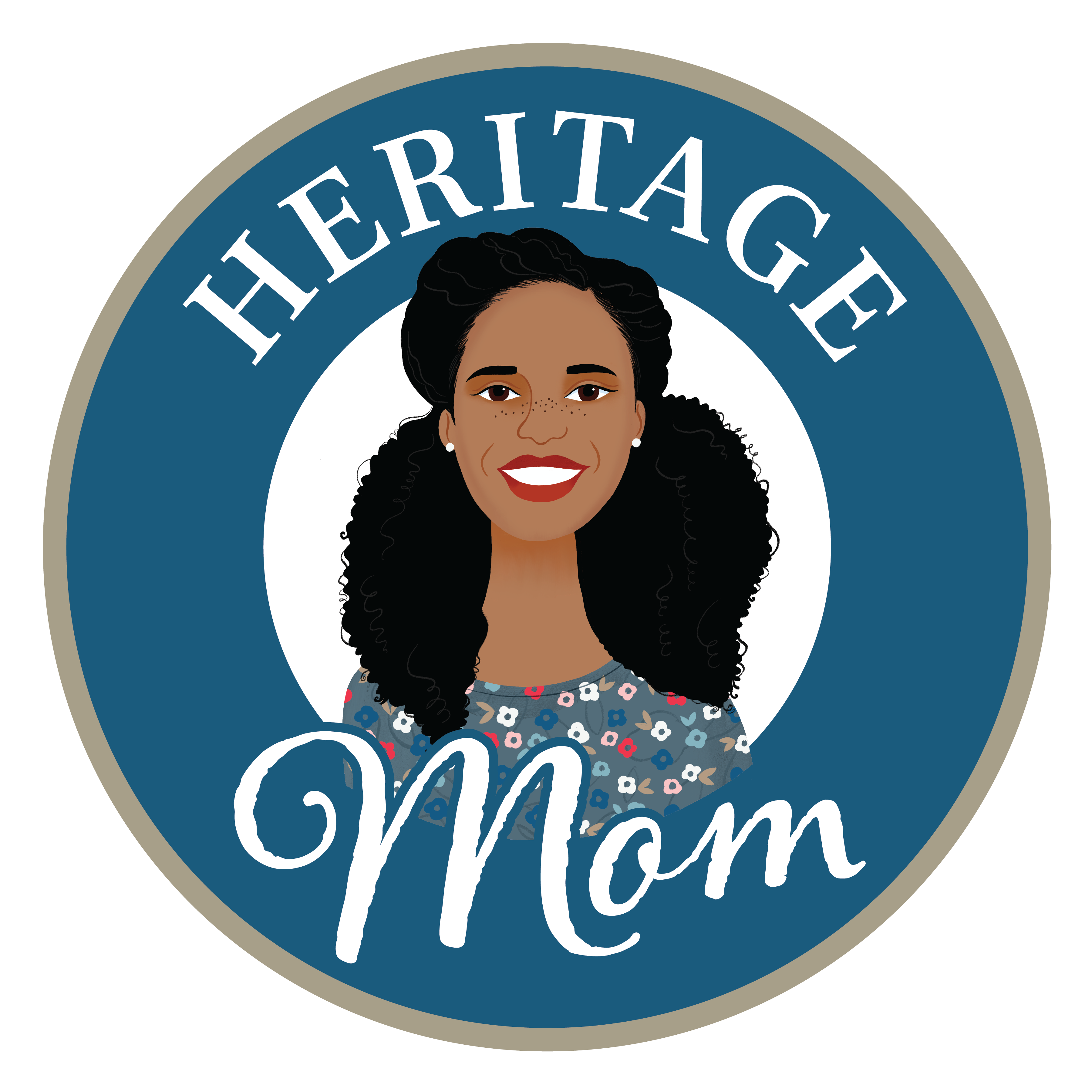
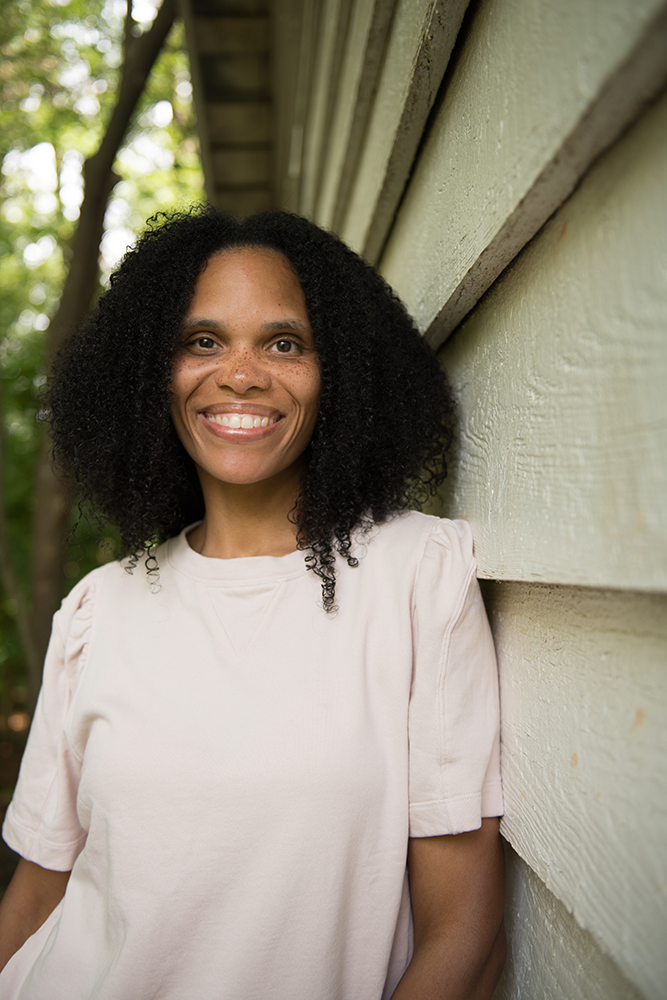
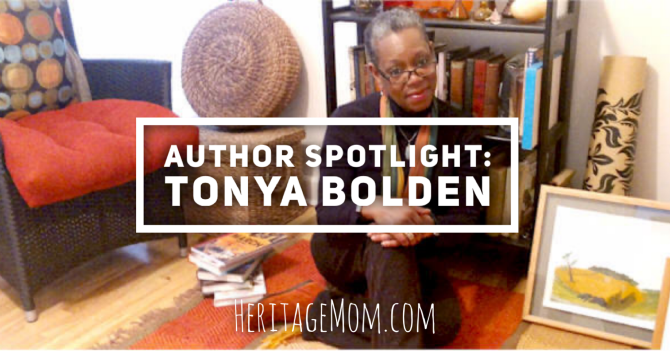
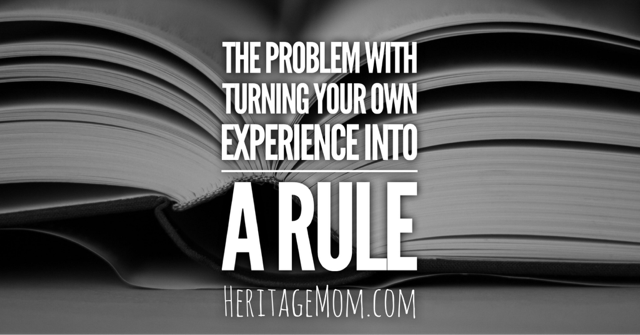
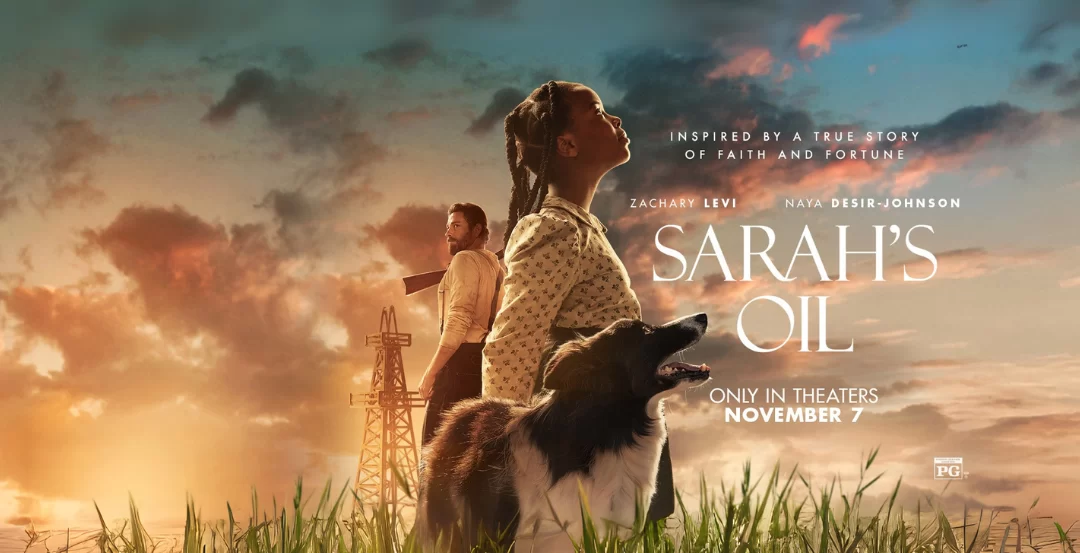
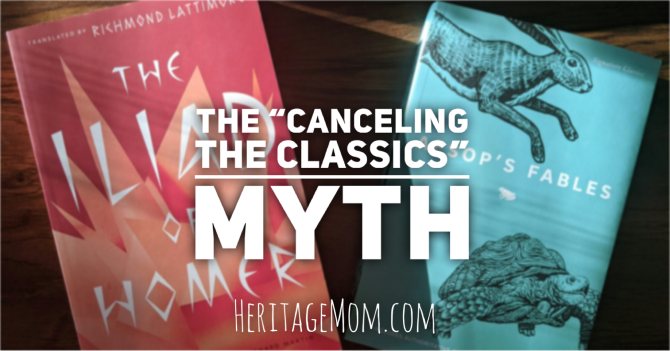
Thank you for sharing so many recommendations! We will definitely use some of these the next time we study 20th century. I admit I have found this year challenging as it has been 1000-1650 and next year will be 1650-1800 which may also be challenging to find as many resources as I’d like. We have used some book suggestions from Woke Homeschooling curriculum but have eliminated some I didn’t like.
You’re welcome! I totally feel your pain with that time period. I don’t have my resources for next year selected, but I’ll be sure to post when I do. It won’t help you much since we’re a year behind you, but I’ll also share anything I find for 1650-1800 while I’m looking. The last time we did 1000-1650 my kids were much younger, and we focused on ancient African civilizations at a high level.
So glad to find a homeschool mom with a balanced approach…your sharing opened my eyes to more resources than AO offers… I like to know the whole truth and I don’t want my kids to only know one side of history. I grew up in an integrated church; my first teaching position was in an all-black high school an hour away from my home, so I’m especially grateful to see more recommendations for diverse, historical literature than what I’ve known.
Thank you, Angela! I’m working really hard to make these resources available to everyone because I know that so many of my fellow homeschool moms WANT to share more inclusive books, but it takes a lot of time and effort to find the right ones.
Angela, I feel the same! I’ve loved using AO for my daughter’s first year, but my goal for year 2 and beyond is to include more books that reflect multiple perspectives. So thankful for the resources on this blog!
Angela, I’m excited about the number of CM moms who are open to expanding beyond what we’ve been doing to include more voices!
As a white mom of five sons, three white and two black, I want so much to give a balanced view of history. I grew up with Black history month as a child, but like you I believe history is history. We are currently using the Simply Charlotte Mason history curriculum, and I am tucking biographies of people of color who I wish were included or received more focus. Thank you so very much for the book recommendations!
You are so welcome! Adding in POC biographies is something I do too. It’s a great way to help round out our lessons.
Any books on black inventors
Not sure which age group you’re looking for, but here’s one we’ve enjoyed: https://www.amazon.com/dp/1648768687/ref=cm_sw_r_as_gl_api_gl_i_M959J2BYGEWSM3EKRSHD?linkCode=ml2&tag=heritagemom-20
Thank you for this! We have been in the 1800s this year and have used some of those resources, but there are many I wasn’t aware of – it’s such a gift to hear your perspective. We will be back in 1000-1650 next year as well, and I’m definitely on the hunt for things to incorporate.
I’m hunting right along with you, and I’ll post what I’ve found soon. I’m waiting on some books to be delivered from Amazon so I can check them out before deciding if I’m going to use them. Be sure to let us know what you find too!
Thanks for the info. I’m currently piecing together history for my soon to be 8th grader and 1st grader, we’ve unschooled for this topic since starting our home education journey. I love history and really wanted to buckle down and offer a well rounded factual view of American history. Thanks again for the list of resources. We’re working on finding resources for 1492-1900 currently.
I’ll have a few recommendations for the early part of your time period soon as we’re doing 800-1600 next. I’m waiting for some of the books I’ve found to arrive so I can see them before deciding what to use. Admittedly, it becomes harder to find all that I wish for during the earlier centuries – not because things weren’t happening, but because much of it wasn’t acknowledged and/or recorded. And, of course, another reason that it’s hard for me is that I’m an amateur, and I don’t always know exactly what I’m looking for. My dream is for some awesome college professor to stumble across my site and step in to HELP US ALL! 🙂
I need to see if I can contact my college professor from Georgia State — I took a wonderful graduate course with her on Early African-American Literature (Ida B Wells and such) about 15 years ago, but she might know earlier resources.
Thank you for all the work you have put it to these book lists. I know what I would books I would assign to high school students, but have had trouble finding appropriate materials for my middle school-aged and younger kids. Your resources are a blessing to folks like me!
Allison, that is why I do all of this – to be a blessing to other families – so thank you for letting me know this. It would be AMAZING if your professor contact was willing to share titles or even just point me in the right direction. I’d be forever thankful.
Beautiful post, and thank you so much for listing all of this here together! I had some of the resources, but I definitely needed those poetry recs. I think the same about the hymns too. They’re all beautiful, but there are differences in styles. We looked at Mahalia Jackson and Kristine DiMarco for It is Well. Thank you so much again!!
Thank you and you’re welcome. Oooooh…Mahalia. I’m going to look that version up! I hope you love the poetry 🙂
Thank you so so so much for these resources! I am honestly a couple years away from these subjects, but am saving them all on a list to come back to! Will you be continuing with Ambleside online otherwise for their general schedule or is there another curriculum you have found you enjoy? I ask because I just really feel like I mesh with all your philosophy a lot!
I no longer follow the AO schedule, but I continue to occasionally pull from their booklists and other amazing resources. I’ve learned so much from their forums and some of the long-time CM moms who blog and use AO. However, I now start with the Alveary (Charlotte Mason Institute) and tweak/drop/add as needed to fit my family. In terms of the black history lesson plans, those are almost entirely compiled from scratch by me each year. I’d be super happy if I could buy those too, but I still haven’t found what I’m looking for so I continue to build it out year by year.
We also use the Alveary (tweaking as needed)! I’m really excited to see what you are able to find to fit next year’s Time period and ways you are infusing more diversity into the resources given to us by the Alveary. I am passionate about giving my children an education that is infused with all cultures and I’m thankful for mamas like you who share what you are learning and finding along the way. (Btw, you really should contact the Alveary and give them input on books, etc, that you have added to your curriculum. In my conversations with them it sounds like they would love to have more voices helping to add to the diversity the curriculum could provide) Thank you!
That’s so cool! I just sent you a private message on The Hive just to say hello there for fun 🙂 I saw your pic – beautiful family. I thought about sharing my finds with the Alveary, but I was concerned that some of my history selections are old books that are hard to find, and they (understandably) try to avoid those. Maybe I should send it anyway since some of the choices are widely available. Thank you for the suggestion.
” In terms of the black history lesson plans, those are almost entirely compiled from scratch by me each year. I’d be super happy if I could buy those too, but I still haven’t found what I’m looking for so I continue to build it out year by year.”
Ummm. . . You’re already doing the work — I hope when the time is right you can package things as an off-the-shelf curriculum!
I really appreciate the commentary you have provided about your thinking and choosing process and details about resources.
(Thanks to AO, we’ve been singing a lot of Elizabeth Cotton this year, too!)
I worried that the post was way too long and detailed, so it’s nice to hear that you appreciated the extra commentary. And go AO! I was excited to hear that they’d chosen her this year. That’s very cool. And thank you for the encouragement. I really need to get over myself, but I never feel any stress right now because I’m just giving it all away so no one will complain if it’s not perfect. But if I turn it into a business, I’ll feel all of the responsibility of a business owner. We’ll see. Maybe some day!
Maybe someday!
And yes, there is joy in the freedom of giving it away — and if people don’t like your recommendations, they don’t have to use them! LOL!
Personally, it’s been easier for me to find poetry/hymns/folk songs/composers (on my own) than they other categories. Maybe that’s because my Mom emphasized those things? It’s really valuable to have guidance on the resources which are harder for me.
We live overseas and move every couple of years, thanks to my husband’s job. In some places we live, it is easier to find living books (in English) about the history and culture than in other places.
The joy of being a homeschool mom and expat is I’m always learning — both from desire and necessity!
I’m sad your Greece / worldschooling was cut short.
Yes, I agree that travel is such an amazing learning experience – like none other, really. I’m sure that it’s not easy to always find the resources you want overseas, but hopefully the rich experiences make up for what may be lacking. I’m totally bummed about the worldschooling trip too 🙁
Love this so much! We studied William Grant Still as one of our 20th c composers (and did a term on jazz). Horace Pippin for picture study (and Henry Ossawa Tanner). Read from Nikki Grimes’s One Last Word for poetry, and watched Hidden Figures in addition to books like 12 Days in May and We’ve Got a Job for Civil Rights. I’m white, but I’ve tried to include non-white history/art/literature along the way as a matter of course. One of my favorite resources is Answering the Cry for Freedom (Revolutionary War era). We did our narrations as a story quilt (illustrated on graph paper). I’d love to know what you find for middle ages because that’s our time period next year. It’s a little more challenging, although we’re doing a picture study on some Medieval Chinese art
I love how you’re seamlessly integrating other voices and stories into your plans. You’re right. It certainly is a more challenging time period. I have some resources that overlap that area in my Early Modern History post, but not a ton. I really like the Medieval Chinese art study though.
Hi there, I appreciate this book list so much – thank you.
Have you use Stories of America Vol. 1? We are studying 800-1600 this year, and the curriculum I’m using chose this book as a spine. I’m wondering if you’ve had any interaction with it and what you think. Thanks!
Yes, I have that book. So…I think you can use it, but you need to skip some things. Do you have the book? If so, turn to page 56 and read what it says about Native Americans. It’s currently ranked as one of the most offensive things I’ve read in a recommended school book since I’ve started homeschooling.
Thank you for this heads up about Vol 1, Amber. I am looking for spines for both World History and American History. I hear names of curricula passed around (Oh Freedom, Blossom and Root, etc) but I’m so reluctant to purchase something without holding it in my hands and scanning through it.
In a podcast interview you did, you spoke to centering our children’s learning on our heritage, helping them to understand their place in the world, their roots, their neighbors/brothers (for example, starting with US history instead of British history, studying Spanish instead of French, etc). This has been an anchoring perspective for me as I plan and prep for my first homeschool year (3 kids 8, 6, and 4yo, all previously public schooled).
Thank you for sharing your journey here.
You’re welcome! Thank you for listening to the Charlotte Mason Poetry podcast.
I’ve been hearing more about Blossom & Root, so I need to check that out soon. As for Oh Freedom, it could work for your oldest, but it may be better to hold off on that one. I have it and like it a lot, but it targets 3rd-7th, I believe, and you won’t get as much out of it at such young ages because you’ll likely need to skip many of the books/readings. That’s just my two cents for what it’s worth!
Thanks for being here, and I hope you thoroughly enjoy this school year!
I have to agree with this comment. That part of the reason I find myself here today. I was all set to go with what I thought I was going to use for history this year (CSM -Early Modern) but over the last few weeks as I’ve been searching the reading selection I’m discovering the truth regarding the term “white washed” history. The comments about the Native Americans was heart breaking and it really made me question the whole integrity of the writer (sorry to sound divisive).. I appreciate your book suggestions. I’m in the process of trying to compile a different list from scratch.. I’m feeling overwhelmed. I’ll have to go through and pick a few and just go from there I supposed. The other thing is that I really want the history to be balanced.. I have always been fascinated by the scattered stories of Native Americans that I’ve heard and I really want to honor the Native American as well as the African American community as apart of American history as a whole. Pray for me to have insight, balance and wisdom..
Lauralei, I will definitely pray for you as this is no easy task. I hope that you will not be stressed out about the selection process. Depending on the ages of your children, you may even be able to forego a spine altogether in favor of picture books, biographies, and historical fiction. In either case, you will do your best, and the gap will be filled by our Father.
Thank you so much for all the details! I’m a brown mama too and have also been piecing together American history curriculum. (It’s a little exhausting is t it?)
I’m so happy for all your notes; you mentioned a few times you were waiting for your kids to be more mature for a few things, would you mind sharing your kids ages?
It sure is exhausting! That’s why I share everything here because it makes all of the work more worthwhile if I know other people are using it too. My children are 10, 8, 6, and 4.
Thanks for the great recommendations. My copy of Heart and Soul just arrived a few days ago and I’m so excited to be adding it to our AO Year 5 next month. (Along with Freedom’s Daughters for myself as I try to do the same history years but higher level/cycle of AO for myself. In theory that will keep me from drowing in pre-reading when I have high schoolers). I am a words girl but I’m also a big fan of beautiful “picture” books for older kids and that one certainly is beautiful.
It’s so beautiful! He is one of our favorite illustrators. I hope you enjoy Freedom’s Daughters. It is a big book. I’m just taking it little by little.
This is all so so great! I’m so excited to find you! Thank you!!!
Thank you, Allie! I’m happy you found my little slice of the web as well. Welcome!
Thank you for this post! Can I ask, where does “Heart and Soul” begin in time? We are beginning our first grade year this fall and I’m wondering if we can add it to our curriculum. What ages would you say it is appropriate for?
I’m really grateful for your wisdom here. Using your affiliate links wherever possible for us!
Thank you so much for using those. I really appreciate it so much. I’m glad you’re here!
I just finished listening to your talk on Doors and Windows. It was wonderful. When you spoke of life giving books not always being in the golden age, I thought of Sonlight Books. We just finished year 4 of Ambleside Online, and we love it. However, I frequently reach to Sonlight, which I had used with my older children, to find windows.
I agree with you there. We started with Sonlight, and I continued to purchase some of their books for that very reason.
I’m sorry if I missed this in the content of your post somehow – but can you tell me what form/grade your kids were in when you followed this plan? Thanks so much!
It’s funny that I didn’t mention that. Smh. I need to update that later! This post is from this school year (2019-2020), and they were in Forms 2b, 1a upper, and 1b (or 4th, 3rd, and 1st grade). My 1b son did not sit in on all of these lessons though. Also, it’s important that I add that these were not introductory lessons for my older children. They have been learning about a lot of this for a long time through the use of picture books. We just went deeper this year with prolonged and more intentional study. I wouldn’t necessarily recommend these books as a starting place; it would depend on the child. Also, my 2b child is old for her age (late birthday) so in terms of maturity and ability, it was more like she was 2a and I selected her books accordingly. And my 1a has always done history with her older sister, so she gets an extra dose of a lot of things early. She can’t always read everything, but she understands everything perfectly when I read aloud. I don’t know if those extra notes help, but I wanted to document it all here in case others are wondering too.
Oh. My. Word. I happened along your blog a couple of days ago for the first time and it was like a breath of fresh air. Seriously. Like I’m Elijah hearing about the 700 who have not bowed down. I have been homeschooling for 12 years (if you count preschool) and we started with AO for about 3 years. But I moved away from it because I wanted an education that could better reflect my kid’s cultural heritage. I am Mexican American American and my husband is Black and I currently homeschool fully bilingual Spanish immersion style. Recently, I’ve been reflecting on what an abysmal job I’ve done to teach my older daughters about their Black heritage and I set about to course correct. Also, my daughters told me recently that without their foundation with CM they would have flunked out of their classical high school in a week! So I’m thinking I’ve got some work to do to both with CM and culturally. Hubby is a worship/youth pastor and I have an online piano studio and, Sweet Lord, finding BOOKS that are both living and LIFE GIVING (as you say) for ages 5-17 in two languages and cultures that are not the majority culture is FREAKING EXHAUSTING. Your site is LIFE. And seriously, I will be using the resources you have found and so generously shared with us. You’ve also inspired me to take a second look at CM again and maybe try the kool-aid again. 😂 Thank you, thank you!
I felt so many emotions while reading this, but mostly I feel excited for you. It is DEFINITELY exhausting, so I hope you find plenty to get into on my site. But you also have such an opportunity to infuse your home with so much culture. You’re already doing an amazing thing with the bilingual immersion. That is HUGE! I’m really glad that you’re here.
You are so encouraging. I love how you are so intentional to respond with grace and positive encouragement. God has definitely given you such a gift! I’m glad to be here.
Aww, thank you for saying that. I really do try to be the friend I want to have.
These are great ideas and suggestions; thanks so much for sharing them. I have a question for you as well – I just bought your Heart and Soul Heritage Pack, and I was wondering how you lay out your day with the plans. Do you do everything all in a row (poetry, reads, etc.), read the historical fiction as a free read, read them together, have your children read them on their own and narrate, or something else?
You bet! No, I don’t do everything in a row. I read the poetry one day each week during our regular poetry time. I read Heart and Soul or the history book during our history time slot, and I read the historical fiction aloud in the afternoon, during lunch, or at bedtime. I think having them read it on their own would also be totally fine, but that’s my children’s favorite part, so we’ve just had a tradition of reading those particular books together. I do have them read other historical fiction on their own. We just typically read the Black history ones together.
Ohhhh, gotcha. That makes sense! Thanks! (And I hear you on the read alouds – we love them, and I don’t want to give up reading them, too, or experiencing them together, so we probably read aloud a lot of things they could do on their own. 🙂 )
Same, girl, same!
THANK YOU for this list and article – I’m a British mom who could have written those first few paragraphs verbatim (swapping out British for American ;)) History is history right??! I’m currently working hard to construct a history curriculum for my kids that reflects their bi-racial culture and doesn’t have ‘add-on’ black history but integrates it into timelines as relevant. But resources on Black British history specifically for kids is quite scarce. I have however been able to pick up some great ideas for resources from your list for when we cover American History – The Civil Rights Movement for Kids activity book looks fabulous and the Mildred Taylor books will make great readalouds while we’re on that topic. So glad to have found your blog. Thanks again X
You’re welcome! This is not the first time I’ve heard about the lack of resources on Black British history. It’s wonderful that you’re searching out resources for your children, and I love your commitment to integrate them in rather than have them presented as something wholly separate. I don’t know how old your kids are, but one of my UK readers shared these books as good options: https://shop.scholastic.co.uk/series/1456. Happy hunting!
Wonderful! Thanks so much :))
What age groups / grades were you kids for this curriculum?
4th, 3rd, and 1st. However, we’ve been talking about Black history for a long time, so this wasn’t their first go at this material. We were digging deeper and more intentionally with these lessons. I’d say the history books are more typically of 4th-6th grade material. The Zenith books could even go on into middle school if the child is reading to himself (I read them aloud). And my 1st grader did not sit in on the top part of the post. I read the picture books listed to him, and he participated in everything below the picture books – picture study, composer study, hymn, poetry, etc.
Hello! This post is amazing and I’m so glad to have found it. I’ve been looking at purchasing wokehomeschooling’s Oh Freedom curriculum as well – wondering if you have thoughts on it?
Thank you! Yes, I have that curriculum. I bought it as soon as it came out! We had already read many of the included books by that time, so we haven’t gone through it week by week as written, but I think it’s very good. The target grades begin with 3rd grade, and I think 5th grade seems about right for starting, in my opinion, but it definitely depends on the family.
WOW! WOW!! WOW!!! You are the treasure I have been searching for! THANK YOU!!!
Yay! That’s so great to hear. I’m really glad that you found something useful.
Wow! Definitely looking for more historical resources on American history for sure! Thank you so much!
I have a story. We learned about the Mexican/American war a couple weeks ago. My ethnicity is Mexican/Spanish/Apache. My children are also German/English ethnicity. I just found Meet Josefina at the thrift store and my daughter was reading it. BOTH my children INSISTED Josefina’s story wasn’t American!! I was appalled but hid my surprise and simply educated them that a story of a Mexican girl in New Mexico (with the same last name I was born with!! Hard to not identify with that!) in the 1820s is definitely at least as American as Native Americans and Pilgrims. But sincerely, HOW can they belong to this country and not know the stories of their American ancestors? I know Josefina is fictional, but humor me, here.
The western Christian classical tradition is, indeed, a great one and I long to know more about it. But I and my children need to see how we and others fit into the puzzle of humanity as well. I think Cindy Rollins has a great point about remembering. Or was that Stratford Caldecott? I don’t know, but my kiddos need to be jotting down/ recording some stories from their grandparents here soon.
It’s funny that you say that. My daughter just interviewed my mom on Friday about her courtship and marriage with my dad. My dad passed away a month after my oldest was born, so he got to hold her, but obviously she doesn’t remember him. My parents’ would have celebrated 59 years of marriage last week, so it was just a perfect time for my daughter to hear about their relationship and learn a little more about her heritage. It was so sweet to hear her asking questions and the look on her face when she found out that her grandparents knew each other from birth! But anyway, I enjoyed hearing your story about Josefina (We have that doll and book!). It’s so interesting to learn how our kids see the world, and I’m thankful that we have the opportunity to intervene and redirect them towards the truth.
Thanks again for your time and research and for sharing it all! We are doing American history and I will definitely be using some of these resources. I am starting a CM moms group in our area (first meeting tonight!) and I plan to share your blog there as well. Thanks again!
Congratulations on your new group! I hope that many fruitful discussions (and friendships) are birthed from your efforts. And thank you so much for sharing my blog. I really appreciate that, and I hope your group members enjoy it.
Amber~
Thank you for the time and energy you have spent on all these amazing resources, and for sharing them with me and mine!❤ I have been praying about how best to teach my children true Black History, this coming year! (We school on a calendar year.) I am the white mama (and my husband is also white) of a beautiful transracial family, through the miracle of adoption and my heart has been so utterly broken as I contemplate what life has already been like for SO many, including our family (we have had experiences with white privilege and racism even from extended family) and what life may be like for my children and especially my Black sons and my Black Biracial daughter, as they grow up in this world. Your blog was recommended to me, today, and is an absolute answer to prayers! I am committed to spending my privilege to make this world better for us all! Thank you for all you do!❤ I will be using your Amazon affiliate links, to purchase books for our homeschool and for upcoming Christmas and Easter gifts!
Gratefully,
Rānee Hansen
(pronounced “rainy)
Hi Ranee! It’s so nice to meet you, and I’m really glad that you found me here. It sounds like you have a beautiful family, and it warms my heart to hear you prioritizing their history lessons. Thank you for using the affiliate links. I spend so much money purchasing books to review here, so that really does help keep things going. I hope you find a lot of helpful resources here!
Thank you, thank you! Can’t wait to add many of these to our reading list. Do you have any other picture book biographies to recommend? A list of these that I haven’t found on your website yet, maybe? I’m especially interested in Early American history era bios for just now, but the more comprehensive the better for use in future year. Thanks!
No, I don’t have that type of list in any of the posts, but my Heritage Packs are full of wonderful picture book biographies (check the shop link for details). Not sure of the exact years you’re considering, but you could include books on Crispus Attucks, Benjamin Banneker, and Phillis Wheatley. For an earlier time period (which I’m doing this year), I’m focusing a lot on African kingdoms (along with what was happening in other parts of the world), and you can find the books I’m using here: https://heritagemom.com/2020/05/27/african-african-american-resources-for-early-modern-history/
I hope this helps!
What do you think about the Chains and The Seeds of America series by Laurie Halse Anderson?
I love that series. In fact, the books are on my shelf waiting for my older children to read next school year when we return to that time period.
Hi! I’m interested to know if you have specific recommendations for biographies, particularly MLK’s. The Patterson one in the pictures seems to be geared for middle school, and I’m looking for something suitable to read aloud to my middle-elementary kids. Thanks!
We’ve read several picture books on him, and a couple of our favorites are My Dream of Martin Luther King by Faith Ringgold and My Daddy, Dr. Martin Luther King, Jr. However, I think the Patterson book is perfect as an elementary read aloud. My middle schooler is well beyond that now. I’m happy to send you some inside shots if you email me. heritagemomblog@gmail
THIS IS FABULOUS! Thank you!
You are so welcome. I’m really glad that you like it!
Just wanted to say thank you for these resources. I used your recommendations last year while planning history and came back for more help this year. I am homeschooling my Korean-American kids and I don’t want them to have a “real Americans are white” perspective from too many white history resources. I also appreciate that you share the same faith as me. I am so thankful for you.
Thank you so much for taking the time to encourage me here. You’re very welcome! It really pleases me whenever I hear that other families are able to use any of the resources and book ideas that I offer here.
I am bookmarking your site! Wow, what a great resource! I am in my second year homeschooling (7th grade and 4th grade) and am just now getting the hang of things. This year our homeschool community (a customized kind of CC) is using Biblioplan’s history. I’m not happy with how it glosses over the African-American and Native-American experiences so I’ve been looking for resources to supplement. And I hit the jackpot with your website!
What a compliment! I’m thankful that you found my website, and I’m glad to have you here.
I love this! Everything is oh so helpful. I, too try to schedule half of our biographies of people of color. I appreciate your explanation of how you do history. I think many people mistakenly assume that you’ve jumped to the other extreme of ONLY reading about black history but clearly you care about giving your children the whole picture including a wide variety of backgrounds! I’ll be adding many of these books to my home library. Thankyou!!!
I’m so glad that you find it helpful! And you’re right, I’ve always only wanted an expansion of literature – not a narrowing in the opposite direction. So nice to know you feel the same way.